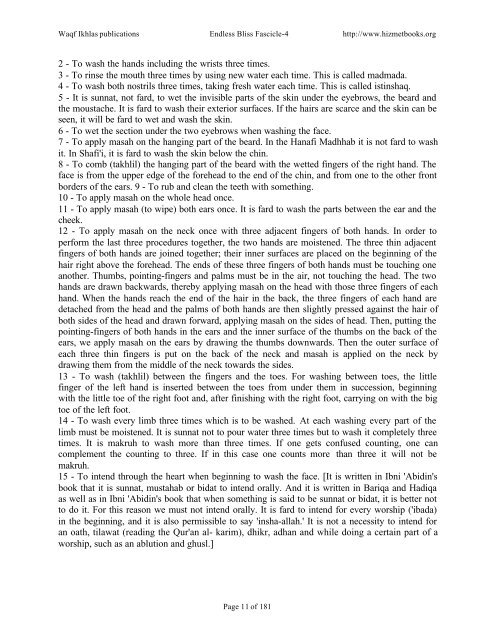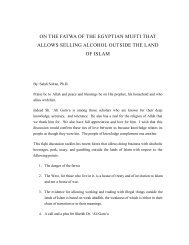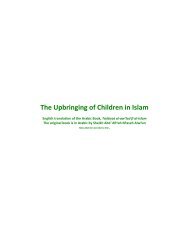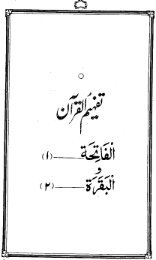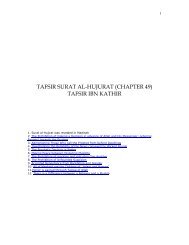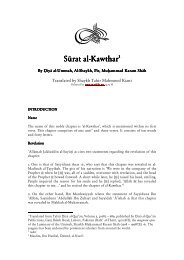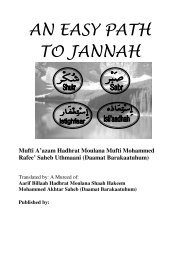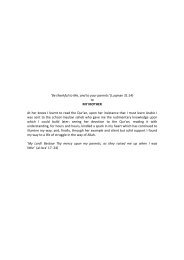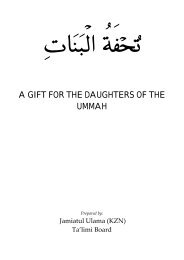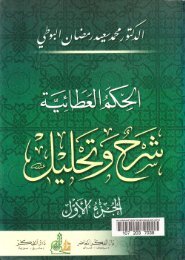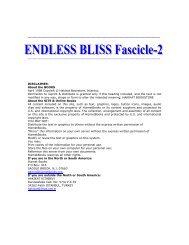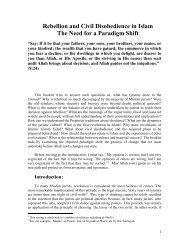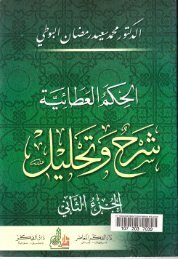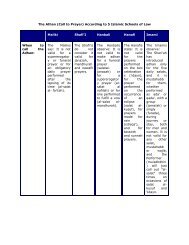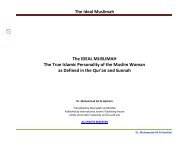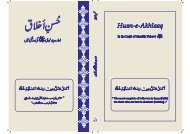ENDLESS BLISS FASCICLE-4
ENDLESS BLISS FASCICLE-4
ENDLESS BLISS FASCICLE-4
Create successful ePaper yourself
Turn your PDF publications into a flip-book with our unique Google optimized e-Paper software.
Waqf Ikhlas publications Endless Bliss Fascicle-4 http://www.hizmetbooks.org<br />
2 - To wash the hands including the wrists three times.<br />
3 - To rinse the mouth three times by using new water each time. This is called madmada.<br />
4 - To wash both nostrils three times, taking fresh water each time. This is called istinshaq.<br />
5 - It is sunnat, not fard, to wet the invisible parts of the skin under the eyebrows, the beard and<br />
the moustache. It is fard to wash their exterior surfaces. If the hairs are scarce and the skin can be<br />
seen, it will be fard to wet and wash the skin.<br />
6 - To wet the section under the two eyebrows when washing the face.<br />
7 - To apply masah on the hanging part of the beard. In the Hanafi Madhhab it is not fard to wash<br />
it. In Shafi'i, it is fard to wash the skin below the chin.<br />
8 - To comb (takhlil) the hanging part of the beard with the wetted fingers of the right hand. The<br />
face is from the upper edge of the forehead to the end of the chin, and from one to the other front<br />
borders of the ears. 9 - To rub and clean the teeth with something.<br />
10 - To apply masah on the whole head once.<br />
11 - To apply masah (to wipe) both ears once. It is fard to wash the parts between the ear and the<br />
cheek.<br />
12 - To apply masah on the neck once with three adjacent fingers of both hands. In order to<br />
perform the last three procedures together, the two hands are moistened. The three thin adjacent<br />
fingers of both hands are joined together; their inner surfaces are placed on the beginning of the<br />
hair right above the forehead. The ends of these three fingers of both hands must be touching one<br />
another. Thumbs, pointing-fingers and palms must be in the air, not touching the head. The two<br />
hands are drawn backwards, thereby applying masah on the head with those three fingers of each<br />
hand. When the hands reach the end of the hair in the back, the three fingers of each hand are<br />
detached from the head and the palms of both hands are then slightly pressed against the hair of<br />
both sides of the head and drawn forward, applying masah on the sides of head. Then, putting the<br />
pointing-fingers of both hands in the ears and the inner surface of the thumbs on the back of the<br />
ears, we apply masah on the ears by drawing the thumbs downwards. Then the outer surface of<br />
each three thin fingers is put on the back of the neck and masah is applied on the neck by<br />
drawing them from the middle of the neck towards the sides.<br />
13 - To wash (takhlil) between the fingers and the toes. For washing between toes, the little<br />
finger of the left hand is inserted between the toes from under them in succession, beginning<br />
with the little toe of the right foot and, after finishing with the right foot, carrying on with the big<br />
toe of the left foot.<br />
14 - To wash every limb three times which is to be washed. At each washing every part of the<br />
limb must be moistened. It is sunnat not to pour water three times but to wash it completely three<br />
times. It is makruh to wash more than three times. If one gets confused counting, one can<br />
complement the counting to three. If in this case one counts more than three it will not be<br />
makruh.<br />
15 - To intend through the heart when beginning to wash the face. [It is written in Ibni 'Abidin's<br />
book that it is sunnat, mustahab or bidat to intend orally. And it is written in Bariqa and Hadiqa<br />
as well as in Ibni 'Abidin's book that when something is said to be sunnat or bidat, it is better not<br />
to do it. For this reason we must not intend orally. It is fard to intend for every worship ('ibada)<br />
in the beginning, and it is also permissible to say 'insha-allah.' It is not a necessity to intend for<br />
an oath, tilawat (reading the Qur'an al- karim), dhikr, adhan and while doing a certain part of a<br />
worship, such as an ablution and ghusl.]<br />
Page 11 of 181


